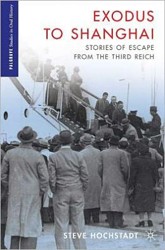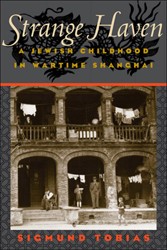January 10, 2012
History is more than names, dates, and facts. History is also the small details of everyday life, often not noted by historians. How does one cope with illness, find food, earn a living, adjust to strange surroundings, and attempt to preserve one’s humanity under the harsh conditions of war and poverty? Little is known of the 20,000 Jews who escaped to Shanghai during the Holocaust. Hebrew University professor emeritus Irene Eber has searched archives, libraries, private collections, and defunct newspapers to find letters, diaries, poems, short stories, and even cartoons that were composed by Jewish refugees in Shanghai in Yiddish, German, and Polish. Drawing from these documents she has painted a colorful picture of how uprooted and displaced families exemplified courage, strength, and determination to survive and even thrive under the most difficult circumstances. Shanghai was a city of 3.5 million people, with fifty nationalities, and saturated with poverty, narcotics, prostitution, and a Chinese language barrier which could not be read, spoken, or understood. Upon arrival in Shanghai , the refugees were dumbfounded to find available street travel by bus, trolley, car, bicycle, water buffalo carts, or rickshaw. Welcome to China!
Via letters, poems, and diaries, we learn that the refugees created a rich cultural life of publishing, theater, and even broadcasting. We can now read their thoughts, hear their voices, and share the poetry they created. Amazingly, there were eleven German-Jewish newspapers and journals. There were even six Yiddish newspapers, both secular and religious. A Yiddish theater had sellout performances of the Dybbuk, Mirele Efros, and even Tevye the Dairyman, which were all written from memory. Remarkably, there was even a Yiddish radio station that broadcast three times a week; a performance of a humorous variety show, “Hamantashen with Rice,” even brought laughs to the refugees.
Documents demonstrate the Jewish refugees’ compassion for the Chinese children, clothed in rags and always hungry, and for the poorest of the poor, such as a rickshaw puller who, running barefoot at night in the cold rain, stepped on a piece of glass but continued to run while the glass cut deeper and deeper into his foot. The refugees’ concern for the suffering of fellow human beings, and anger and disappointment at our indifferent world, are themes we rarely read of in history books.
Reading their letters, we do not find self pity, but worry about those left behind in Europe . We find a description of the Jewish school in Shanghai which during the war provided happiness and self-esteem to the children, had a model curriculum, and even found employment for all the graduates. Impressive, too, are the lectures and newspaper articles that explained and interpreted the Chinese language, philosophy, and culture to the refugees who were eager to understand their new neighbors. And together the Chinese and Jews worked with superhuman strength to rescue those buried in the ruins when their area was accidentally bombed by Americans. Fortunately, Professor Eber found a woman’s diary, for now we can read a woman’s perception and hear a woman’s voice, so often neglected by historians.
Remarkably, Eber was able to translate German and Yiddish poetry into English rhyme. (For those who can read German or Yiddish, it would have been helpful if the original text had been printed alongside the translation.) All writers and readers of history can learn a valuable lesson from Eber. Index of names, notes.




